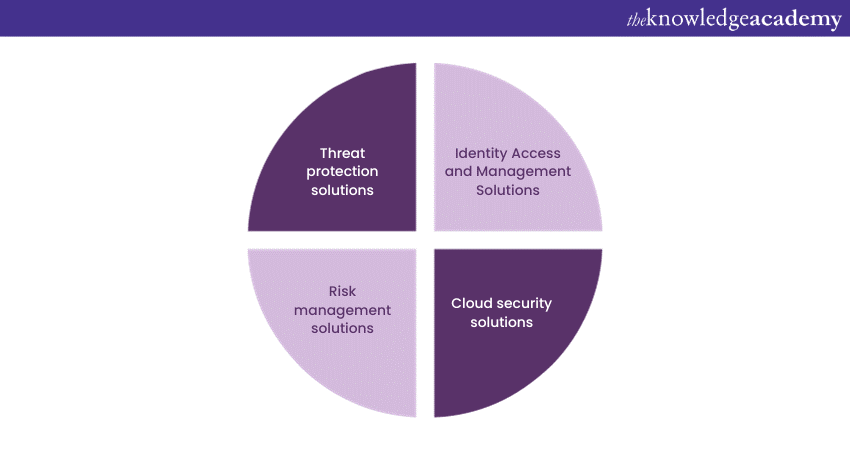We may not have the course you’re looking for. If you enquire or give us a call on +61 1-800-150644 and speak to our training experts, we may still be able to help with your training requirements.
Training Outcomes Within Your Budget!
We ensure quality, budget-alignment, and timely delivery by our expert instructors.

A better, secure future always requires a better approach. There is no doubt in saying that technology plays a very important role, but when it comes to security, it should always be human-centred. That’s where Microsoft Security came into play. Microsoft Security provides advanced threat detection and data encryption solutions for online safety and also safeguards data privacy.
According to Digital Defence Report 2022, 70 billion email and identity threat attacks were blocked by Microsoft last year alone and 2.75 million site registrations were effectively blocked by Microsoft to get ahead of criminal actors.
In this blog, we'll explore Microsoft Security, including solutions like Microsoft Identity access management, cloud security, threat protection, and risk management.
Table of Contents
1) What is Microsoft Security?
2) What are the key solutions of Microsoft Security?
a) Microsoft Identity Access and Management Solutions
b) Microsoft Cloud Security Solutions
c) Microsoft Risk Management Solutions
d) Microsoft Threat Protection Solutions
3) What is Zero Trust in Microsoft 365?
4) Conclusion
What is Microsoft Security?
Microsoft Security is a comprehensive collection of tools, technologies, and practices developed by Microsoft. Its purpose is to safeguard digital systems and data from various security risks and threats including cyberattacks and unauthorised access. This includes services for identity management, endpoint protection, threat intelligence, cloud security, application security, data protection compliance, and more. Microsoft security aims to provide a layered defence approach to ensure the security of digital environments.
What are the key solutions of Microsoft Security?

Here are the four key solutions of Microsoft security.
1) Identity Access and Management Solutions
2) Cloud security solutions
3) Risk management solutions
4) Threat protection solutions
Let’s understand each Microsoft Security solution in detail.
Identity Access and Management (IAM) solutions
Identity and Access Management (IAM) solutions are formed to manage user identities, control their access to resources, and ensure secure authentication and authorisation processes within an organisation’s digital ecosystem. Microsoft offers a range of IAM solutions as a part of its broader Microsoft Security offerings. Let’s dive into the benefits of this solution.
1) Enhanced security: IAM solution helps organisations bolster their security posture by enforcing strong authentication methods such as multi-factor authentication and ensuring that only authorised users can access sensitive resources. This reduces the risk of unauthorised access and data breaches.
2) Efficient access management: IAM streamlines the process of granting and managing access to various resources. This efficiency improves user productivity by reducing the time and effort required to access the tools and data they need.
3) Centralised identity management: IAM provides a centralised platform for managing user identities, access permissions and authentication methods. This simplifies the process of granting and revoking access, reducing the chance of errors and inconsistencies.
4) Compliance and auditing: IAM solutions help organisations adhere to regulatory compliance requirements by maintaining accurate records of user access and permissions.
Cloud security solutions
A cloud security solution refers to a set of tools, practices, and technologies designed to protect data, applications, services, and infrastructures hosted in cloud environments from security threats and risks. Cloud security solutions address the unique challenges that arise when organisations migrate their operations and data to cloud platforms. These solutions guarantee the confidentiality, integrity, and availability of cloud-based resources while allowing organisations to leverage the benefits of cloud computing. Here are the following benefits of cloud security solutions.
1) Data protection: Cloud security solutions include encryption mechanisms to protect data both at rest and in transit. This safeguards sensitive information from unauthorised access and breaches.
2) Access control: These solutions manage user identities, access permissions and authentication mechanisms to ensure that only authorised individuals can access cloud resources.
3) Network security: Cloud security solutions include features to secure network communications between various cloud instances and services. Firewalls, intrusion detection and prevention systems, and Virtual Private Networks (VPNs) are often used to establish secure network boundaries.
4) Vulnerability management: Cloud security solutions help identify and patch vulnerabilities in cloud environments. Regular scans and assessments are conducted to detect potential dangers that could be exploited by attackers.
Unlock the power of data security with our Microsoft Information Protection Administrator SC400 Course. Register today!
Risk management solutions
Microsoft risk management solutions encompass a variety of tools and services that are designed to help organisations identify, access, and mitigate risk across their digital environments. These solutions focused on areas such as cybersecurity, compliance, and business continuity. Here’s the breakdown of how risk management solutions benefit.
1) Insider risk management: This enables the organisation to identify, detect, and take appropriate steps against insider risk by certain measures such as insider risk policies.
2) Communication compliance: Risk management solution helps in reducing both external and internal communication risks by enabling the organisation to quickly identify and take steps against any inappropriate messages that can exploit the organisation’s code of conduct policy.
3) Information barriers: This solution supports the organisation in empowering them to restrict or limit communication and collaboration among specific users or groups if needed, to safeguard internal information and prevent conflict of interest.
4) Privileged Access Management (PAM): This enables the organisation to deal with privileged admin access by deleting privileges from other privileged accounts and offers sufficient access to perform critical and privileged tasks.
Threat protection solutions
A threat protection solution is a set of tools, technologies, and practices designed to detect, prevent and retort to various types of cyber security threats that could compromise an organisation’s digital assets, system, and data. The goal of threat protection solutions is to safeguard against a wide range of cyberattacks and unauthorised activities that could lead to data breaches, disruptions, or other forms of harm. Here's the detailed explanation.
1) Security Information and Event Management (SIEM): Threat protection solutions include Azure Sentinel, which allows the organisation to identify and prevent threats before they cause any harm to the digital ecosystem. It gives the organisation a holistic approach. Azure Sentinel enables the organisation to identify and analyse threats efficiently and take appropriate actions against them.
2) Extended Detection and Response (XDR): XDR is a threat protection solution that consolidates and analyses data from various sources to provide comprehensive threat detection, response, and investigation across multiple attack vectors, such as endpoints, networks, and cloud environments.
Level up your expertise with our Microsoft Identity & Access Administrator SC300 Course!
What is Zero Trust in Microsoft 365?
Zero Trust in Microsoft 365 is a security approach that assumes no implicit trust, regardless of whether users or devices are inside or outside an organisation’s network perimeter. It emphasises continuous verification of identity, strict access control, and fast monitoring and protection of resources. With Zero Trust in Microsoft 365, users and devices are authenticated and authorised individually, reducing the attack surface and enhancing data security across the entire digital ecosystem.
If you want to learn to design a Zero Trust strategy and architecture by signing up in our Microsoft Cybersecurity Architect SC100 Course now!
Conclusion
In conclusion, Microsoft Security offers a fast and comprehensive suite of solutions designed to safeguard digital landscapes from an evolving array of cyber threats. By prioritising security, Microsoft ensures that users can harness the full potential of their technologies while staying protected from the challenges of today’s cyber landscape.
Take your career to the next level as security professionals with our Microsoft Security Engineer Training
Frequently Asked Questions
Upcoming IT Security & Data Protection Resources Batches & Dates
Date
 Microsoft Cybersecurity Architect SC100
Microsoft Cybersecurity Architect SC100
Thu 1st Jan 1970







 Top Rated Course
Top Rated Course



 If you wish to make any changes to your course, please
If you wish to make any changes to your course, please


